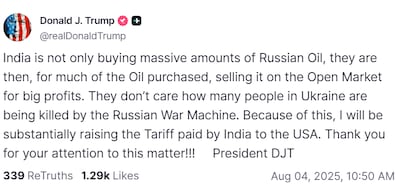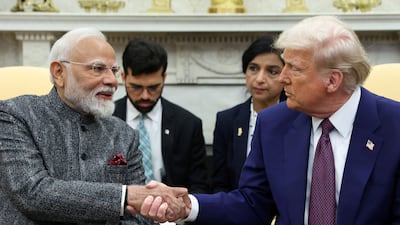President Donald Trump on Monday announced the US would “substantially” increase tariffs on India for buying Russian oil.
The announcement comes as US special envoy Steve Witkoff is expected to travel to Russia this week in an effort to secure a deal to end the Russia-Ukraine war.
“India is not only buying massive amounts of Russian Oil, they are then, for much of the Oil purchased, selling it on the Open Market for big profits,” Mr Trump wrote in a post on Truth Social. “They don’t care how many people in Ukraine are being killed by the Russian War Machine. Because of this, I will be substantially raising the Tariff paid by India to the USA.”

Last week, he announced 25 per cent tariffs on India.
India responded by describing the US actions as "unjustified and unreasonable".
"Like any major economy, India will take all necessary measures to safeguard its national interests and economic security," Foreign Ministry spokesman Randhir Jaiswal said in a statement.
The Trump administration has been hesitant to enact sanctions on Russia – a favoured tool of former president Joe Biden's administration – but it has threatened to use other means to put pressure on Moscow.
On July 14, Mr Trump gave Russia 50 days to end the war, or countries that import Russian oil will face 100 per cent tariffs. The deadline is Friday for Moscow to stop the war or face Washington enacting secondary tariffs on countries that trade with Russia.
“We’ve got to get to a deal where people stop getting killed,” the President told reporters on Sunday, saying Mr Witkoff would head to Russia on Wednesday or Thursday. If a deal is not reached, Mr Trump said “there will be sanctions”.
“But they seem to be pretty good at avoiding sanctions,” he added. “You know, they’re wily characters and they’re pretty good at avoiding sanctions. So we’ll see what happens.”
Mr Trump campaigned on a promise to end the war in Ukraine within the first 24 hours of his second term, but he has found resolving the conflict more difficult than he expected. At first, Mr Trump took a more aggressive stance towards Ukraine and attempted a softer tone with Russian President Vladimir Putin, but he has been increasingly frustrated by Russia’s continued military campaign, which has intensified in recent weeks.
The conflict began in February 2022, when Russian forces invaded Ukraine in what they claimed was an effort to protect Russian-speaking communities in the eastern part of the country. Kyiv has been buoyed by an influx of funding and weapons from Western countries looking to counter Mr Putin, though the conflict has largely ground to a standstill.
Mr Witkoff is expected to head to Russia from Israel. On Friday, he visited an aid distribution centre in Gaza.


